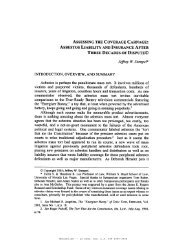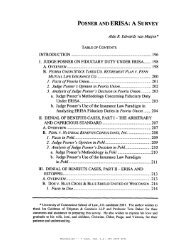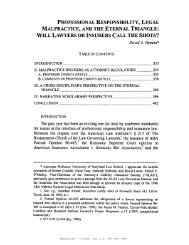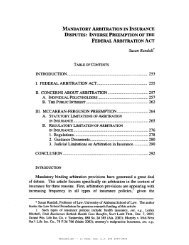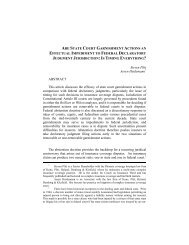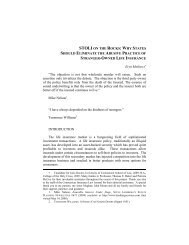Whither the Duty of Good Faith in UK Insurance Contracts, John Lowry
Whither the Duty of Good Faith in UK Insurance Contracts, John Lowry
Whither the Duty of Good Faith in UK Insurance Contracts, John Lowry
Create successful ePaper yourself
Turn your PDF publications into a flip-book with our unique Google optimized e-Paper software.
110 CONNECTICUT INSURANCE LAW JOURNAL [Vol. 16:1<br />
this, among o<strong>the</strong>r particulars, exceptional, <strong>in</strong> that <strong>the</strong>y require on both sides<br />
uberrima fides. Hence, without fraudulent <strong>in</strong>tent, and even bona fides, <strong>the</strong><br />
<strong>in</strong>sured may fail <strong>in</strong> <strong>the</strong> duty <strong>of</strong> disclosure.” 62<br />
This decision is followed soon after by Ionides v. Pender, <strong>in</strong> which<br />
Blackburn J. was moved to assimilate <strong>the</strong> prevail<strong>in</strong>g view <strong>in</strong>to <strong>the</strong> so-called<br />
“prudent <strong>in</strong>surer” test. 63 While <strong>the</strong> judge accepted that “it would be too<br />
much to put on <strong>the</strong> assured <strong>the</strong> duty <strong>of</strong> disclos<strong>in</strong>g everyth<strong>in</strong>g which might<br />
<strong>in</strong>fluence <strong>the</strong> m<strong>in</strong>d <strong>of</strong> an underwriter,” he never<strong>the</strong>less conceded that “a<br />
concealment <strong>of</strong> a material fact, though made without any fraudulent<br />
<strong>in</strong>tention, vitiates <strong>the</strong> policy.” 64 Blackburn J. concluded by stat<strong>in</strong>g that “all<br />
should be disclosed which would affect <strong>the</strong> judgment <strong>of</strong> a rational<br />
underwriter govern<strong>in</strong>g himself by <strong>the</strong> pr<strong>in</strong>ciples and calculations on which<br />
underwriters do <strong>in</strong> practice act.” 65<br />
62 (1873) 11 M. 351, 359. It might be <strong>the</strong> case that this generation <strong>of</strong> judges<br />
was perhaps plac<strong>in</strong>g too much reliance on Park’s Law <strong>of</strong> Mar<strong>in</strong>e <strong>Insurance</strong><br />
published <strong>in</strong> 1787, ra<strong>the</strong>r than trac<strong>in</strong>g Lord Mansfield’s reason<strong>in</strong>g first hand. For<br />
example, chapter 10 <strong>of</strong> Park’s treatise states that “<strong>the</strong> learned judges <strong>of</strong> our courts<br />
<strong>of</strong> law, feel<strong>in</strong>g that <strong>the</strong> very essence <strong>of</strong> <strong>in</strong>surance consists <strong>in</strong> a rigid attention to <strong>the</strong><br />
purest good faith, and <strong>the</strong> strictest <strong>in</strong>tegrity, have constantly held that it is vacated<br />
and annulled by any <strong>the</strong> least shadow <strong>of</strong> fraud or undue concealment.” PARK,<br />
supra note 18, at 174 (emphasis supplied).<br />
63 (1874) 9 L.R.Q.B. 531. This was <strong>in</strong>corporated by Chalmers <strong>in</strong>to § 18(2) <strong>of</strong><br />
<strong>the</strong> Mar<strong>in</strong>e <strong>Insurance</strong> Act, 1906, 6 Edw. 7, c.41 (Eng.), which provides, “[e]very<br />
circumstance is material which would <strong>in</strong>fluence <strong>the</strong> judgment <strong>of</strong> a prudent <strong>in</strong>surer<br />
<strong>in</strong> fix<strong>in</strong>g <strong>the</strong> premium, or determ<strong>in</strong><strong>in</strong>g whe<strong>the</strong>r he will take <strong>the</strong> risk.”<br />
64 Ionides, 9 L.R.Q.B. at 537, 539.<br />
65 Id. at 539. A fur<strong>the</strong>r opportunity to put forward his view on <strong>the</strong> scope <strong>of</strong><br />
<strong>the</strong> duty <strong>of</strong> disclosure was taken by him, now Lord Blackburn, <strong>in</strong> Brownlie v.<br />
Campbell, (1880) 5 App. Cas. 925, <strong>in</strong> which he noted:<br />
… [i]n policies <strong>of</strong> <strong>in</strong>surance, whe<strong>the</strong>r mar<strong>in</strong>e <strong>in</strong>surance or life<br />
<strong>in</strong>surance, <strong>the</strong>re is an understand<strong>in</strong>g that <strong>the</strong> contract is uberrima<br />
fides, that if you know any circumstance at all that may <strong>in</strong>fluence<br />
<strong>the</strong> underwriter's op<strong>in</strong>ion as to <strong>the</strong> risk he is <strong>in</strong>curr<strong>in</strong>g, and<br />
consequently as to whe<strong>the</strong>r he will take it, or what premium he<br />
will charge if he does take it, you will state what you know.<br />
There is an obligation <strong>the</strong>re to disclose what you know; and <strong>the</strong><br />
concealment <strong>of</strong> a material circumstance known to you, whe<strong>the</strong>r<br />
you thought it material or not, avoids <strong>the</strong> policy.<br />
Id. at 954. Material facts are typically categorised as ei<strong>the</strong>r those relat<strong>in</strong>g to



